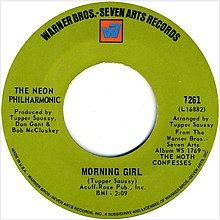The Neon Philharmonic
| The Neon Philharmonic | |
|---|---|

The 45 of the hit song, "Morning Girl" by Neon Philharmonic from 1969.
|
|
| Background information | |
| Origin | United States |
| Genres | Psychedelic pop |
| Years active | 1967 to 1975 |
| Labels |
Warner Bros. TRX MCA Records London Records Sundazed Rhino Records |
| Past members | Kenneth A. Buttrey Jerry Carrigan Chip Young Don Gant Dennis Good Rufus Long Pierre Menard Norbert Putnam Tupper Saussy Don Sheffield Chuck Wyatt |
The Neon Philharmonic (formed 1967) was an American psychedelic popband led by songwriter and conductor Tupper Saussy and singer Don Gant. They released their only two albums (The Moth Confesses and the eponymous The Neon Philharmonic) in 1969, and they scored a Top 20 hit on the Billboard Hot 100 chart with "Morning Girl", which featured the Nashville Symphony Orchestra, when it hit the Top 40 in May of that year and rose to number 17 on Billboard and number 15 on the Cash Box chart. The band hit the charts again with "Heighdy-Ho Princess" in 1970. The group was produced by Saussy, Gant, and Bob McCluskey, and engineered by Ronald Gant, Don's brother. The group disbanded in 1975 after releasing numerous non-album singles. Although the first album stated Borges Forever!, the group's concertmaster, is really Pierre Menard, and it is not a reference to the Jorge Luis Borges story Pierre Menard, Author of the Quixote,, Saussy was not conscious of the connection.
The bulk of the group's output was released by Warner Bros./Seven Arts Records. In 1972, they moved to TRX and produced another single, "Annie Poor" / "Love Will Find a Way", after which the group disbanded. The Neon Philharmonic name was sold to producer David Kastle, who put out additional singles released by MCA Records and London Records. At least one Saussy song, "Making Out the Best I Can", was recorded by this group and engineered by Ronald Gant. Along with its flipside recording, "So Glad You're a Woman", written by Ray Williams and Ron Demmans (MCA-40158 (MC 4810), 1975), the instrumentation was limited to synthesizers, guitar and drums. These later singles have no other connection to the original group.
...
Wikipedia
